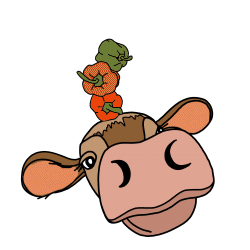Last updated Feb. 6 @ 6:30
In an article published in the Sheaf’s opinions section on Jan. 25, a student suggested that a vegetarian or vegan diet is the most ethical means of nourishment — partly basing this claim on biased and inflammatory information.
“Everyone has different reasons for consuming the foods they do, and regardless of your diet, I think the importance lies in being critical and doing our research to make sure that we are protecting the planet and others as best we can,” says Mackenzie Paradzik in her article — and you know what? She’s right.
The beautiful part of living in a country with global trade is that you can go to the supermarket on any day of the week and find anything to suit your fancy — from Colombian fair trade coffee to cucumbers and peppers from Spain. Generally, Canadians have unlimited access to a variety of high quality, safe and affordable foods.
We’re not here to tell you what you should or shouldn’t eat — that’s up to you. So, what’s our beef?
It is important to be critical of information and ensure your buying and eating decisions are well informed — but be wary. While documentaries like Cowspiracy: The Sustainability Secret and Forks Over Knives make claims accusing the livestock industry of every kind of travesty, they fail to provide completely factual information.
For example, livestock emissions make up only about 15 per cent of carbon emissions, and while a plant-based diet is great for certain degenerative conditions, the omega-3 oil available from plant-based sources isn’t always enough.
The intents of these documentaries — environmental protection, water conservation, pollution prevention, healthy living and sustainability — are noble, but their supporting data is highly biased and often framed in compulsory ways, playing to our emotions and using guilt tactics.
The beef industry constantly comes under fire for many issues that arise from misinformed and often extremist groups that have no intention of considering information from those on the other side of the argument — farmers and ranchers, the very people who dedicate their lives to feeding the world.
In an ongoing study funded by the Beef Cattle Research Council, researchers Tim McAllister and Karen Beauchemin aim to explain how beef cattle contribute positively to the environment through their ability to convert low-quality forages into high-quality protein for humans. Their research also focuses on a “grassland’s contributions to carbon sequestration, maintenance of watersheds, wetlands, and habitat to support plant, animal, bird and insect biodiversity.”
Sustainability is absolutely a top priority for beef producers in Canada, and the need to protect resources and commit to improving soil, air and water quality for future generations is widely understood. Canada is a global leader in animal health and welfare, food safety and managing environmental impacts and is constantly striving to improve.
Being the best isn’t good enough — farmers, ranchers and researchers here at the University of Saskatchewan, and across the nation, are continuously working to do better. There is a constant effort to be transparent and to provide consumers with credible, science-based information on food production — from farm to fork.
So, next time you’re enjoying a steak, whether it be cabbage or beef, we challenge you to consider both sides of the narrative and question the validity of the information you hear.
For more information on beef production in Canada, check out the Beef Cattle Research Council, contact the U of S Beef Team or submit your questions to the Sheaf’s “Ask an Agro” columnists by emailing opinions@thesheaf.com or askanagro@gmail.com.
—
Kalen Dunn and the U of S Beef Team
Graphic: Lesia Karalash / Graphics Editor
Correction: A paragraph written by a different author was accidentally inserted into an earlier version of this article during the editorial process. It was removed at the request of the actual author of the paragraph. We apologize for this error.